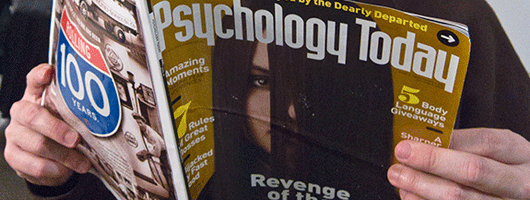 Bachelor of Arts (B.A.) in Psychology
Bachelor of Arts (B.A.) in Psychology
4-Year Degree Plan [Sample]
Academic Advising
College policy on advising requires that students meet with their academic advisors at least once each year, and in some departments, prior to each semester’s enrollment. Advising holds are placed on all CLAS students prior to advance registration and are released following advising appointments. Students with a declared major are advised in their academic units. To determine who your advisor is and how to contact them, see Onestart.
Degree Requirements (120 cr.)
Students receiving the Bachelor of Arts degree must complete 120 total credit hours including:
- The IU South Bend campuswide general-education curriculum (33-39 cr.)
- The College of Liberal Arts and Sciences Bachelor of Arts additional requirements (14-23 cr.)
- Major concentration and elective requirements.
- The required minor (15-18 cr.) taken in any campus school or interdisciplinary program.
- A minimum of 30 credit hours at the 300- or 400-level.
In addition, major and minor requirements must be completed with a grade of C– or higher.
All courses are 3 credit hours, unless otherwise designated.
Major Requirements (33 cr.)
Note | Psychology majors and minors are advised to take PSY-P 103 General Psychology (or PSY-P 106 General Psychology–Honors) as soon as possible since it is the prerequisite for all other psychology courses.
Select one of the following:
- PSY-P 103 General Psychology
- PSY-P 106 General Psychology–Honors
Core requirements
- PSY-P 211 Methods of Experimental Psychology
- PSY-P 354 Statistical Analysis in Psychology
- PSY-P 403 Nonexperimental Research Methods in Psychology
- PSY-P 459 History and Systems of Psychology
Select one advanced laboratory:
Note | All laboratories require successful completion of PSY-P 211, PSY-P 354, and PSY-P 403. These prerequisites cannot be taken concurrently with any of the advanced labs.
- PSY-P 420 Advanced Laboratory in Community Psychology
- PSY-P 435 Laboratory: Human Learning and Cognition
- PSY-P 471 Laboratory in Developmental and Social Psychology
- PSY-P 481 Laboratory in Clinical Psychology
Other Requirements
Five additional courses; one from each of the four areas listed below, plus one additional PSY-P course other than PSY-P 205 Understanding Research in Psychology and PSY-P 495 Readings and Research in Psychology.
Developmental
- PSY-P 216 Life Span Developmental Psychology (cannot receive credit for both PSY-P 216 and PSY-P 316)
- PSY-P 316 Psychology of Childhood and Adolescence (cannot receive credit for both PSY-P 216 and PSY-P 316)
- PSY-P 331 Psychology of Aging
Social
- PSY-P 320 Social Psychology
- PSY-P 434 Community Psychology
Personality and Clinical
- PSY-P 319 The Psychology of Personality
- PSY-P 324 Abnormal Psychology
Cognition, Learning, Neuroscience
- PSY-P 325 The Psychology of Learning
- PSY-P 326 Behavioral Neuroscience
- PSY-P 329 Sensation and Perception
- PSY-P 335 Cognitive Psychology
Recommended Courses
Psychology majors and minors are advised to take PSY-P 103 General Psychology (or PSY-P 106 General Psychology–Honors) as soon as possible since it is the prerequisite for all other psychology courses.
Coursework in the physical and biological sciences and a sound foundation in mathematics is advised for psychology majors. Students planning graduate work in psychology are encouraged to become involved in faculty and independent research projects and should discuss their plans for graduate school with a faculty advisor as soon as possible.
A minor in cognitive science is available for students interested in topics such as artificial intelligence, philosophy of the mind, computer science, and cognition.
Note | PSY-B 190 and PSY-B 399 Human Behavior and Social Institutions do not count toward the psychology major or minor, nor do they substitute for PSY-P 103 General Psychology as a prerequisite for any other psychology courses.